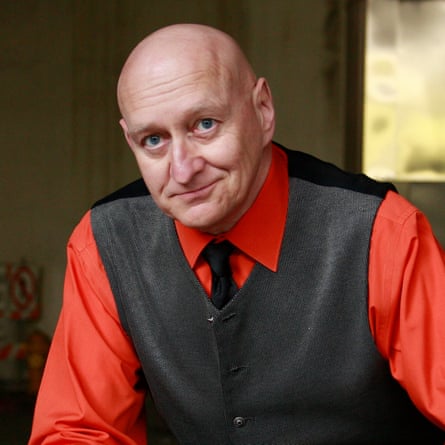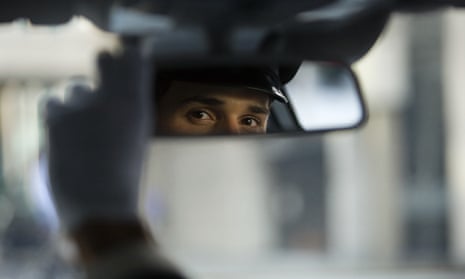In the early hours of one morning, nearly a decade ago, chauffeur Jayne Amelia Larson found herself trying to extricate the son of one of the wealthiest men in Los Angeles from the back of her car. The then-chauffeur had been driving the twentysomething party boy up and down Santa Monica Boulevard in her Lincoln Town car as he tried to procure a “transvestite prostitute” for his girlfriend who, he said, “wanted to convert a gay guy”. After several hours, he threw up on the back seat and fell into a drunken slumber, then woke up and tried to urinate in the car.
“He’d been in rehab again and again,” says Larson, recalling the incident that took place just weeks into her new career. “Another driver I later met had been his family’s driver, and said the kid repeatedly did stuff in the car you would not believe, like he went to the bathroom there because he was just so wasted. And I don’t mean in a clean way; I mean in an awful way.”
Eventually, the chauffeuring firm she worked for directed her to one of the city’s wealthiest neighbourhoods. But as she drove her client through the gates of a huge mansion, he panicked. “He kept saying: ‘Nobody loves me. Please don’t wake my parents. They hate me!’” As the car pulled up, an older man, who she presumes was a member of his parents’ staff, stepped out from the darkness and helped him from the car. “The guy shushed him, and said: ‘You’re home. It’s OK now.’ It was just so weird and terrible and odd.”

Larson’s experience is not as extraordinary as it might seem. Behind the tinted windows of luxury cars, chauffeurs have an insight into a world few people will see – the private, intimate space of the rich and famous. In a profession where personal referrals are important, discretion is taken seriously. But when drivers break this code, the results can be explosive.
I spoke to chauffeurs in the UK and US who recalled disturbing incidents involving VIP clients, from scoring drugs to having sex on the back seats. Last month, the former personal driver to the multimillionaire and Conservative donor Christopher Moran told the Sunday Times that he had been aware that there were “at least a hundred prostitutes” operating from the Chelsea Cloisters apartment block owned by his former boss. Tony Heaney, who drove Moran’s Rolls-Royce for 25 years, told the paper he used to check the bins in the flats for condoms to tot up “exactly how many girls were working there”. The retired chauffeur told the paper he was upset after Moran allegedly failed to thank him when he left the job. Moran denied he knew the extent of the problem and his management took a “zero tolerance” approach to sex work in the building.
Harvey Weinstein’s ex-chauffeur also went public with allegations about his former employer, saying the disgraced mogul had sex in the back of his car with a woman who begged the producer “not to hurt her” (Weinstein has denied the allegations). Jacques Chirac’s former driver, meanwhile, wrote a book claiming his boss had been a serial philanderer.
Chauffeuring can be well paid. The annual salary for personal chauffeurs for executives and super-rich families in London averages between £35,000 and £60,000, according to Irving Scott, an upmarket household staffing agency. Drivers, it says, can expect bonuses for commitment, longevity and loyalty, with discretion and professional secrecy also financially rewarded. Other agencies advertise jobs such as a £35,000-a-year permanent role based in Knightsbridge, London, that includes maintaining the client’s “large collection of supercars and other luxury vehicles including a Rolls-Royce, a Bentley and an armoured Mercedes S class”; and a £40,000-a-year permanent role with a family split between London and a villa in the south of France, with duties also including security, supervising contractors, keeping the exterior of the property empty and putting out deckchairs.
Yet for all the apparent glamour, the exacting nature of chauffeuring VIP clients was exposed last summer when it was alleged that Sir Martin Sorrell, the former chief executive of British advertising giant WPP, had suddenly sacked his personal driver of 15 years in October 2017. The unnamed driver was reportedly asked, at 2am, to pick up Lady Cristiana Sorrell from the exclusive Mayfair restaurant Isabel. The driver then refused to resume work at 7am, explaining he would be too tired to drive safely if he only got two or three hours’ sleep. The paper claimed the Sorrells fired him the next day.
It is impossible to put a total value on the UK’s chauffeuring industry, which, at the top end, includes personal drivers, luxury hotel car services and small and large firms. According to Transport for London, there were more than 12,000 executive-class private hire vehicles – Mercedes E, S and Viano series – less than five years old in the capital in June 2017. Paul Gibson, editor of TheChauffeur.com, says that, in recent years, there has been an increase in the number of companies providing security chauffeurs, with close-protection training for executives, celebrities and super-rich clients. These chauffeurs are often at the high end of the earning bracket thanks to specialist qualifications such as defensive driving, as shown in the BBC drama The Bodyguard.

One of the best known of these companies is Capstar, founded by two former British army officers, Robert Bassett Cross and Charles Bowmont, in 2012. The Brentford-based company began with a mission to recruit ex-forces personnel, included those wounded in action in Iraq and Afghanistan. But Capstar has evolved into a lifestyle and security management service, helping clients with their private club membership or buying fine art and jewellery.
Bowmont, a Sandhurst graduate, is well placed to understand his clients’ needs. A Swiss billionaire’s family, who required a very personal round-the-clock service to manage their daily schedule, are described as close personal friends. “I’d get a WhatsApp message from her going: ‘Right, my husband can’t take the children to school tomorrow, can you get the guys out?’”
When Larson first became a chauffeur, however, unusually, she had no experience of private driving. The Harvard graduate had moved to California to pursue acting and producing. Years later, after months without work, she was persuaded to start chauffeuring by a friend, with the idea that she would have lots of free time to pursue telephone and film projects, and earn enough in tips to help clear her $40,000 debts. Initially hired by a high-end limo company to chauffeur film stars, rock groups and Hollywood moguls to showbiz events including the Golden Globes and the Oscars, she soon discovered the business was all-consuming, with some jobs lasting up to 17 hours.
But the demands of her celebrity clients paled in comparison with those of the Saudi royals Larson worked for after driving for a couple of months. She was one of 40 drivers hired for seven weeks, with no days off, who were to be on call 24/7 for Princess Zaahira (not her real name), her children, the family’s security and their entourage and staff – including nannies, personal assistants and domestic servants. Larson subsequently wrote a play and a book, Driving the Saudis, about her experiences.
Among the most challenging of Larson’s tasks was finding 27 bottles of a particular brand of hair-removal cream late one night, after a 12-hour shift. She went to 20 shops all over LA County and grabbed every bottle she could find. “But when I got back, I was dismissed by the princess’s secretary, who said: “Oh, it’s too late.” On another occasion, she was charged with picking up one of Princess Zaahira’s best friends at a plastic surgery clinic in Beverly Hills. Larson had to wait for hours outside before a nurse discharged the fiftysomething patient, but the woman, who was recovering after having buttock implants, promptly lost consciousness. A flummoxed Larson then had to recruit a group of nearby valets to help her lift the woman into the back of the SUV.
“Within a few days of not eating, not sleeping, of chaos, of the complete contradiction of orders on a minute-by-minute basis, I just realised that the goal here is to survive,” she says. “The royal family and the upper echelon of the staff liked to keep chaos around them to keep you on your toes. And the servants were happy to let you do stuff that they would otherwise have been asked to do by the family.”
Due to her gender and inexperience, Larson was at the bottom of the pecking order of the family’s entourage and the fleet of drivers. She says the princess’s hairdresser bullied and verbally abused her after she was assigned to drive him, offended to be relegated to a female driver of the least luxurious car in the motorcade, a Ford Crown Victoria. Yet she ingratiated herself with Princess Zaahira by recounting tales from the royal entourage’s nightly exploits at casinos, which tradition and decorum dictated that a Saudi princess could not attend. “I would do these little pantomimes for her,” says Larson. “She’d laugh and laugh. I’m sure it was because my accent was horrendous, but also because she was appreciating that I got a bit of the nuance of all the characters, especially the hairdresser. I felt as if I was floating on a little cloud around her.”
She was assigned more luxurious cars and felt she was getting somewhere until the relatively paltry $1,000 tip she received at the end of the seven weeks disabused her. “It was about a fifth of the amount that the other – male – drivers received, after I had done far more work.” Her basic wage was also underwhelming, given her long hours. “A friend of mine figured out it was about $11 [£8.60] an hour, and I remember him saying: ‘Well, that’s not that bad.’ And I said: ‘For an 18-hour day?’”

Gerold Wunstel, a chauffeur who has driven European government ministers in his native Germany and Hollywood stars in Los Angeles during his 24-year career, says those new to the business can get carried away by their proximity to VIP clients. “You think you’re part of the entourage,” he says. “You’re just the bloody chauffeur. Dave Stewart, of the Eurythmics, invited me in to his birthday party. I said no, because I’m not his friend, I’m a professional. You’re not supposed to mingle with Elvis Costello or whoever’s invited.”
Wunstel, who most recently worked as the senior driver for the LA Philharmonic, recalls how a rich Saudi businessman he chauffeured around San Francisco and the Napa valley wine region challenged this. “We hit it off because he was educated in Switzerland and London, and spoke fluent German,” he says. But the client’s love of marijuana tested their relationship. At the beginning of the job, Wunstel drove the man to Haight-Ashbury, where San Francisco dealers hung out. “I had to tell him not to tip the drug dealers,” he says. After four days, Wunstel refused to go to the area again. “I had to say: ‘I’m really sorry but it’s too dangerous,’” he recalls. “‘I’m a new guy in this country. I just got a green card. If the police stop me with some marijuana, I’m in big trouble.’ Which wasn’t necessarily true, but I was not his drug mule.”
His worst-behaved client was a billionaire. “I picked him up from a private airfield and he took a helicopter instead of walking 200 metres to the car,” says Wunstel. “With a stretch limo you have a divider, so you are supposed to not hear anything, but you hear everything. He had sex with a model while I was driving. No class, no manners. He gave me a $100 tip, but that’s not the point.”
Wunstel has driven stars including Bill Murray, George Clooney and Eminem. But he says driving celebrities can be more hassle than it’s worth. “You have to be at the office four hours before because you don’t know when they are touching down in their private plane, and you don’t get paid extra. And, you know, some celebrities do not tip. The more experience I got, the more I realised I just like to drive ‘regular’ people, such as boring lawyers or real-estate guys. You go from one meeting to another and work 10 hours in a stretch, and you get paid.”

Ervin Gjoni, managing director of EG Chauffeurs, based in Westminster, in central London, agrees. Chauffeuring royalty from the Gulf states, such as the UAE, Kuwait or Saudi Arabia, is much more demanding, he says, with some clients sending lists of up to 50 criteria their chauffeurs must meet, covering their dress and grooming. One of EG’s chauffeurs, Manny Qorrolli, says a typical day in London might start at 2pm and might involve shopping in New Bond Street and Harrods for up to three hours apiece, going to a Mayfair restaurant and then to a shisha bar on the Edgware Road until around midnight. He might work up to 60 hours a week, but some Gulf royals have given him £500 tips for a fortnight’s job.
For Larson, the experiences she gained as a chauffeur have changed her behaviour. She says: “One of the first things I do if I’m in a private-hire car now is ask: ‘How long have you been driving today?’ I know that if that guy has been driving 10, 12 or 14 hours, he’s exhausted. But I also make a point of having a conversation, even if I’m not in the mood. Because I know that whenever anybody had a conversation with me, for a moment, I felt like not just a lowly chauffeur. I’m also much more careful in a car now, because I know that the chauffeur could potentially be clocking everything I’m saying or doing.”
